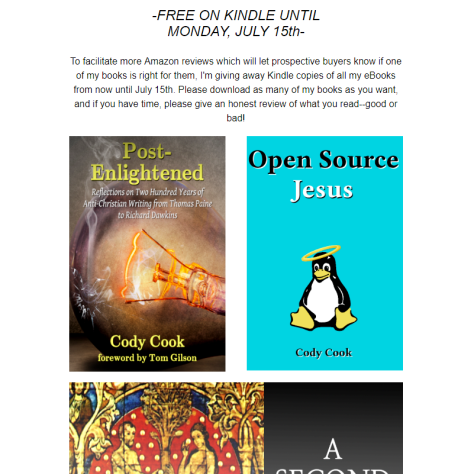Cody Cook's Blog, page 19
October 7, 2019
Three Pro-Life Arguments That Really Suck
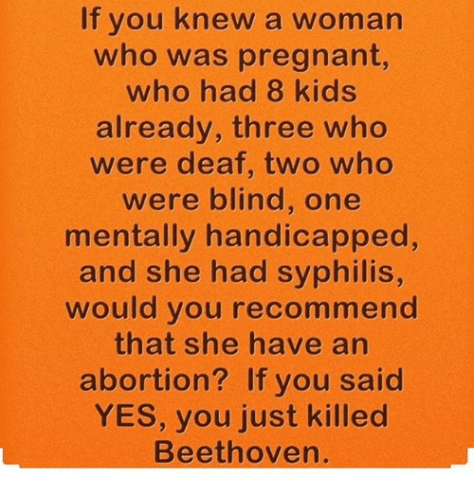 This argument sucks.
This argument sucks.One of the more contentious political issues of our day has to do with the morality and legality of abortion. Regardless of which side you take, there are certain arguments that you should stop using because they’re really, really bad. Be sure to also check out the companion piece, Three Pro-Choice Arguments That Really Suck.
1. What if Beethoven (or Jesus, or Gandhi) had been aborted?
This argument assumes that humans are only valuable insofar as they contribute something to society, which is pretty much the opposite of what the pro-life position is saying. If Beethoven had been a janitor instead of a famous composer, would it have been okay to proactively abort him? Not all fetuses grow up to be Beethoven; most end up being regular people. Some even grow up to be Adolph Hitler.
This is a bad argument, and you should feel bad for using it.
2. Abortion is murder
From a pro-life position, the unborn are living human beings. That would mean abortion is the taking of a human life.
However, not all taking of human life counts as murder. Murder is the intentional and unwarranted taking of human life. However, some women have had abortions either without believing themselves to be taking life or having a justification that most people would find acceptable in any other circumstance.
A woman who gets an abortion because she has been persuaded that the fetus isn’t a living human being but a clump of cells has not intentionally taken a human life.
Similarly, a woman who has an abortion because she has been told by her doctor that to do otherwise would result in her own death is acting in self defense. While people may object to lethal self-defense from a religious or philosophical perspective, it’s still a legally protected action.
Finally, even if a woman has an abortion believing what she’s doing to be murder, taking a strident or condemning attitude toward her is not going to change her mind. Showing grace very well might, though.
3. Outlawing abortion will stop abortion from happening
Remember when alcohol was illegal and everyone stopped drinking, or when marijuana was illegal and your older brother didn’t get stoned all through high school? Me neither. While outlawing abortion might stop some women from seeking them, others will continue to do so.
This means that a pro-life solution which only makes abortion illegal is probably not a solution at all. Pro-lifer, is the goal to virtue signal through legal proclamations or to save what you believe are innocent human babies? If it’s the latter, then the common pro-choice argument that supporting birth control availability should be part of your strategy to stop abortions is one that doesn’t suck.
In addition, you can be the friend, the aunt, the uncle, or the parent who helps the frightened young woman who just found out that she’s pregnant so that she knows there are other options besides abortion. Not only might it be a way to save a life, but it will also take away any excuse for a pro-choice dialogue partner to accuse you of not being sincere in your beliefs.
October 1, 2019
Five Bizarre Facts You Might Not Know About the Bible
Bizarre is in the eye of the beholder. To the ancient world that produced the Bible, these ideas were not strange at all; but for the non-religious and even many religious people living today, these might be surprising and perhaps even shocking revelations.
1. Angels are described as having sex with human women
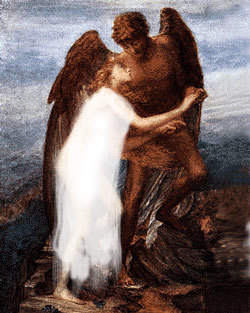
The account of Noah’s flood begins with an intriguing piece of information:
“When man began to multiply on the face of the land and daughters were born to them, the sons of God saw that the daughters of man were attractive. And they took as their wives any they chose… The Nephilim were on the earth in those days, and also afterward, when the sons of God came in to the daughters of man and they bore children to them. These were the mighty men who were of old, the men of renown.” (Genesis 6:1-2, 4, ESV)
The phrase “sons of God” is also used in the Old Testament book of Job, where it clearly refers to angels. Later Bible interpreters, uncomfortable with the clear meaning of this text–that angels had sex with human women and made unique offspring called Nephilim–have tried to create alternative readings. For instance, that “sons of God” is a metaphor for the family line of Seth as opposed to the “daughters of men,” whose lineage derived from the morally suspect Cain.
However, not only does that reading not make sense of Genesis 6, it also fails to make sense of later biblical passages that mention the Nephilim, such as Numbers 13:33 where we read that there were Nephilim after the flood wiped out the line of Cain and that they were large in size (Nephilim likely means something like “giants” and is translated that way in the Greek Old Testament of Jesus’ day, though an alternative reading of “fallen ones” has also been proposed).
While the surface meaning of this passage is hard to deny, it’s at least possible that the reference to Nephilim is not meant to be historical but polemical, meaning that the Hebrew writers were writing this story to criticize their pagan neighbors. Pagan nations in the Ancient Near East often believed that their kings were fit to rule because they were the sons of gods. In contrast, the book of Genesis would be seen as arguing that these supposedly semi-divine kings called down the judgment of God!
2. God is the head of a divine council
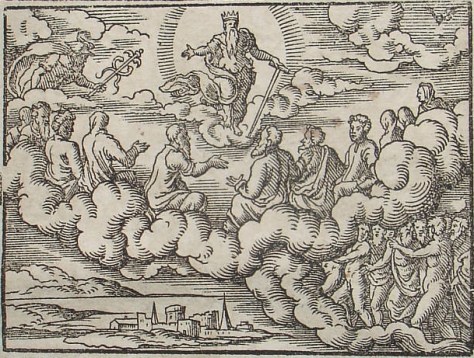
Council of Gods Before the Deluge. Engraving by Virgil Solis for Ovid’s Metamorphoses Book I, 162-208. Fol. 4v, image 7
Speaking of the sons of God, the Bible also tells us that God is over a “divine council” of angels which are given authority over, among other things, the different nations. Deuteronomy 32:8, looking back at the tower of Babel story where God divided the world into nations by confusing human language, claims that God “fixed the borders of the peoples according to the number of the sons of God” (ESV).
This background makes sense of Psalm 82 which describes a scene of God taking “his place in the divine council” and “hold[ing] judgment” over “the gods, sons of the Most High” because of how poorly they’ve done in administering justice over the nations.
Another example of the divine council motif comes from 1 Kings 22:19-22, where God, sitting on His throne with angels on his left and right, asks for their opinion and involvement in making something to come to pass on the earth.
God is not presented as a solitary monarch in the Bible, but seeks to involve angels (and also human beings) in His plans and purposes.
To learn more about divine council theology, check out Dr. Michael Heiser’s book The Unseen Realm.
3. One of the books of the Bible is an erotic love poem

One biblical book has made some readers so uncomfortable with its sexual content that they have re-interpreted it as an allegory for spiritual intimacy between God and Israel or Christ and the church.
The Song of Solomon, also called the Song of Songs, is about two lovers seeking each other and expressing their desire for one another. Here are a few of the racier portions:
“Like an apple tree among the trees of the forest, So is my beloved among the young men. In his shade I took great delight and sat down, And his fruit was sweet to my taste.” (2:3, NASB)
“Your stature is like a palm tree, and your breasts are like its clusters. I said, ‘I will climb the palm tree, I will take hold of its fruit stalks.’ Oh, may your breasts be like clusters of the vine, And the fragrance of your breath like apples, and your mouth like the best wine! It goes down smoothly for my beloved, Flowing gently through the lips of those who fall asleep.” (6:7, NASB)
“Awake, O north wind, And come, wind of the south; Make my garden breathe out fragrance, Let its spices be wafted abroad. May my beloved come into his garden And eat its choice fruits!” (4:16, NASB)
So much for the Bible being anti-sex!
4. Satan is said to be the ruler of this world
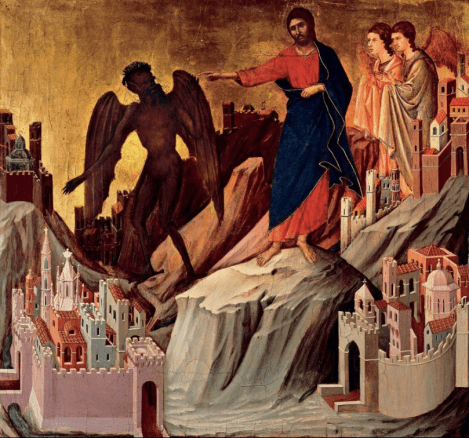
From the 14th-century altarpiece entitled “Maestà ” (Majesty) by Duccio di Buoninsegna.
Remember how God put angelic beings over the nations? Well, the New Testament continues that line of thought, claiming that Satan is “the ruler of this world” (John 12:31, 14:30, and 16:11).
This vague reference is given more detail in a short account of Satan trying to tempt Jesus in the desert. In it, the devil claims to have authority over all of the kingdoms of the world because they’ve been delivered over to him (Luke 4:5-7). It’s not clear if God or man gave this power to Satan, but in any case the devil’s superintendence over the political administration of the entire world appears to be the result of the archetypal man Adam failing in the Garden of Eden and thus losing his charge to reign over the world with God.
For more details on how this motif plays out throughout the Bible, check out my book Fight the Powers: What the Bible Says About the Relationship Between Spiritual Forces and Human Governments.
5. The Bible probably doesn’t present hell as eternal conscious torment
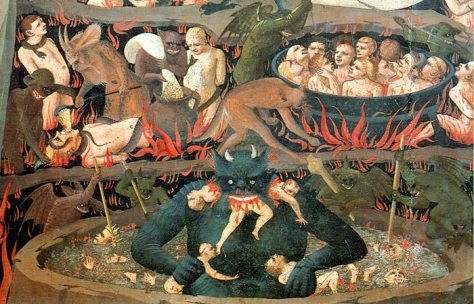 From Fra Angelico’s Last Judgement, c. 1431
From Fra Angelico’s Last Judgement, c. 1431The popular understanding of hell, which is supposedly derived from the Bible, is of the damned suffering through eternal conscious torment. To defend this notion, passages like these are often appealed to:
“[The damned] will go away into eternal punishment, but the righteous into eternal life.” (Matthew 25:46, NASB)
“And the smoke of their torment goes up forever and ever; they have no rest day and night, those who worship the beast and his image, and whoever receives the mark of his name.” (Revelation 14:11, NASB)
“If your eye causes you to stumble, throw it out; it is better for you to enter the kingdom of God with one eye, than, having two eyes, to be cast into hell, where ‘their worm does not die, and the fire is not quenched.'” (Mark 9:47-48, NASB)
“And the devil who deceived them was thrown into the lake of fire and brimstone, where the beast and the false prophet are also; and they will be tormented day and night forever and ever.” (Revelation 20:10, NASB)
These four verses account for the strongest biblical support for the idea of unending torture, but they are not without difficulties. For instance, does eternal punishment have to mean conscious torment, or might the permanence of utter destruction also be described as “eternal?” And what about the fact that the imagery of smoke going up forever and fire not being quenched is borrowed from an Old Testament passage (Isaiah 34:10) about divine punishment which ends? Why would the New Testament authors quote a passage which teaches eternal destruction if they really had in mind eternal conscious torment?
On the other hand, the Bible is full of death and destruction imagery when discussing the ultimate fate of the lost. You see it in passages like these, among many others:
“For the wages of sin is death, but the free gift of God is eternal life in Christ Jesus our Lord.” (Romans 6:23, NASB)
“For God so loved the world, that He gave His only begotten Son, that whoever believes in Him shall not perish, but have eternal life.” (John 3:16, NASB)
“Then they will go forth and look on the corpses of the men who have transgressed against Me. For their worm will not die and their fire will not be quenched; And they will be an abhorrence to all mankind.” (Isaiah 66:24, NASB)
“Christ Jesus . . . abolished death and brought life and immortality to light through the gospel.” (2 Timothy 1:10, NASB)
Though an argument can be made for eternal conscious torment from scripture, there is a preponderance of evidence in favor of annihilation or “conditional immortality.” To learn more, you can get books like Four Views on Hell or Rethinking Hell on Amazon or check out my podcast episode and essay, The Gospel of the Resurrection.
September 29, 2019
Five Books That Changed My Life
The right book at the right time in your life can be like activating a railroad switch that changes your trajectory. Here are five books that did that for me.
1. The Autobiography of Malcolm X
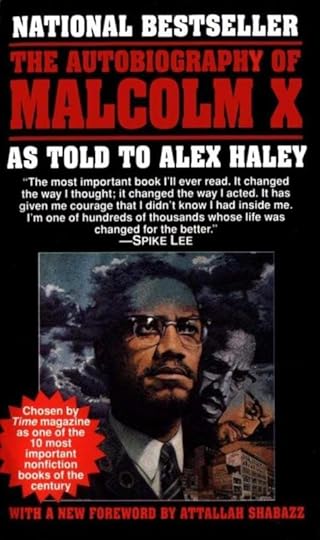
As a teenager with aspirations of being a 1960s radical, I was of course influenced by memoirs of the men I hoped to emulate. Memoirs like Yippie activist Abbie Hoffman’s Soon to Be a Major Motion Picture and Black Panthers co-founder Bobby Seale’s Seize the Time. However, one of these memoirs left a truly lasting impression that has followed me into my thirties: The Autobiography of Malcolm X.
On paper, it’s a strange book to be so significant for me. After all, most of Malcolm’s time in the public spotlight was spent as a spokesperson for a racist anti-white group (I’m white) that was hostile to the Christian beliefs that would eventually become central to my identity.
But what stands out in this book are not the beliefs that Malcolm held at any given time, but his willingness to undergo painful transformation in search of truth. In the process of writing this autobiography, Malcolm went from unquestioning loyalty to the cultic Nation of Islam to being number one on their hit list–all because he had too much integrity to stick up for what he knew was false. This willingness to follow the truth wherever it lead, even to his eventual death, left a lasting impression on me. To this day, Malcolm is an unlikely hero of mine and I recommend this book whenever I have the opportunity to do so.
Click here to get The Autobiography of Malcolm X on Amazon.
2. Brave New World
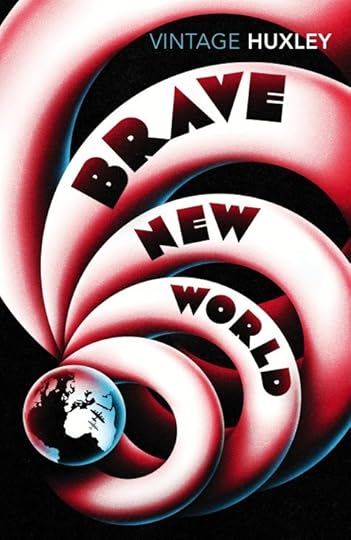
Aldous Huxley’s Brave New World is like the lesser known cousin to George Orwell’s famous dystopian novel 1984. Whereas Orwell’s book (which came almost 20 years after Huxley’s) fictionalized an authoritarian Soviet Union that openly lied to and oppressed its people, Huxley’s vision was of a populace conditioned from conception to want only what the state saw as fit for the maintenance of a perfect social order, which ended up being mindless entertainment and superficial sexuality. Huxley’s approach to dystopia was far more subtle, but it was also more reflective of the benign western authoritarianism that was developing across Europe and the United States wherein the state worked its way into every area of private life, supposedly for the good of the people.
Brave New World taught me to ask questions and think critically–to not simply trust that those in authority knew best but to take control of my own destiny. It also taught me, in the words of the German theologian Dietrich Bonhoeffer, to be “very glad when something affects [me] deeply, and regard the accompanying pains as an enrichment.”
Click here to get Brave New World on Amazon.
3. The Fire That Consumes
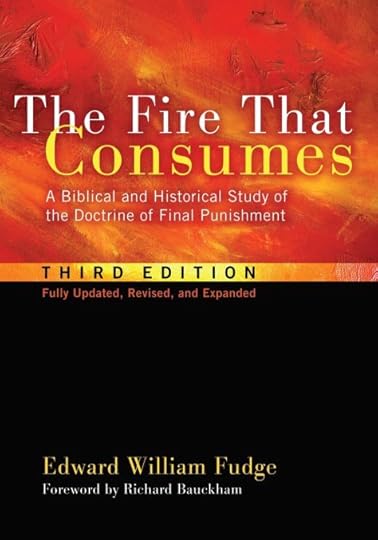
While I was baptized at a young age at my grandmother’s church, I also fell away from her faith at a young age. One of the reasons for my pre-pubescent apostasy was my difficulty with the traditional view of hell as eternal conscious torment. It wasn’t until years later that I became acquainted with the Seventh Day Adventist denomination and learned of the annihilationist view of hell wherein the damned are ultimately destroyed instead of being kept alive to be tormented for all eternity.
Edward Fudge’s book The Fire That Consumes provided a thorough study of the biblical data which not only made me more open to the Christian faith but also taught me to love biblical research, a love which continues to this day. I remember wishing that I, like Fudge, might be able to provide a thorough and convincing analysis on such an important theological topic. I hope that my own research and analysis skills are better for having read Fudge in my formative years.
Click here to get The Fire That Consumes on Amazon.
4. Mere Christianity

Not long into my acceptance of Christian faith, I discovered and read C.S. Lewis’ Mere Christianity. Well, technically, I listened to it. I found a reading of it online and listened to it on numerous occasions at work.
Lewis disabused me of any false notions I had that Christianity was for idiots. He made me want to be an apologist, a philosopher, and an intellectual for Christ. He had a cogent way of making arguments, but he also wielded the English language the way a great artist wields a paintbrush–and sometimes the way a master swordfighter wields a deadly blade. Lewis taught me that Christian should be intelligent and beautiful.
Click here to get Mere Christianity on Amazon.
5. On the Incarnation
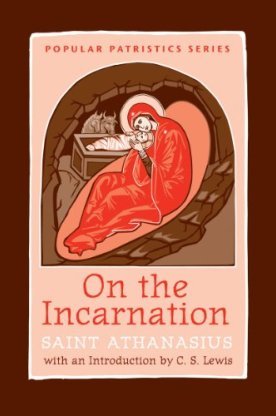
C.S. Lewis’ introduction to a popular English translation of Athanasius’ On the Incarnation exhorts us to read more old books than new, perceiving that, “Every age has its own outlook. It is specially good at seeing certain truths and specially liable to make certain mistakes. We all, therefore, need the books that will correct the characteristic mistakes of our own period. And that means the old books.”
Cicero put it another way, noting that the purpose of education is to free ourselves from “the tyranny of the present” by giving us historical context and teaching us that there have been other ways of thinking and being in the world than just the ones we’re accustomed to.
I don’t think Athanasius was the first church father I read. That honor probably belongs to Justin Martyr. However, he is the first church father I read for the pure joy of it. His On the Incarnation is brilliant, evocative, and free from the modern evangelical biases which I had been taught to think simply were Christianity. He challenged me to think of the church as a global and ancient body and not merely the local or national faith community I was familiar with. He freed me from the tyranny of the present and made me want to read great books that were much older than I was. He also showed me why Jesus is so central to my faith and why both a divine and human Jesus must be defended if we are to have Christianity at all. Finally, Athanasius made me want to be a theologian of an ancient faith that was worthy of defending even in a modern era, and I’ll never be the same after reading him.
Click here to get On the Incarnation at Amazon.
-Cody Cook
September 25, 2019
Why We Chose to Homeschool

Our daughter had a good kindergarten year, liked her teacher, and made friends. But as first grade approached, my wife and I couldn’t shake a feeling of uneasiness about sending her back to public school. We knew that homeschool would involve a lot of changes to our daily schedule that we weren’t sure we could accommodate at first.
And then there were those feelings of inadequacy about taking over our daughter’s education. People go to school for years to equip themselves to teach. Why should we think we could do it ourselves?
Despite our anxieties about taking this big step, we decided it was at least worth trying. Here are some of the big reasons we did.
1. Modern Schooling Stifles Creativity
Nearly everyone who attended public school had at least one good teacher who rose above the inherent limitations of the system to challenge and inspire us. However, it still needs to be said that system itself is not designed to inspire creativity.
The late John Taylor Gatto was an award winning teacher who left the public school system because of his concerns about it. In his book Dumbing Us Down he wrote that in his job as a teacher, “curiosity has no important place in my work, only conformity;” that “successful children do the thinking I assign them, with a minimum of resistance and a decent show of enthusiasm.” This is because modern education is built upon the premise that “people are machines.”
In the public school system, education cannot be guided by the natural interests and curiosity of the student, no matter how much their individuality “[tries] to assert itself.” Instead, the public school system forces every child into a mold. Those that can’t fit into the mold are disciplined for their “bad behavior.” That’s why Gatto, reflecting on his job as a teacher, defined individuality as “behavior that threatens my control.”
We wanted our child to develop her own interests and be encouraged to love learning, not forced into a mold.
2. Modern Schooling Crushes Independence
We haven’t had the public school system for very long, but it has become such a rite of passage in American society that we rarely stop to question it.
What do you call a building that houses people held against their will, where they must line up single file and unquestioningly obey every order, where each ward of the state is treated as a potential threat, where rights are suspended and even using the toilet is a privilege? We normally call them prisons, but many not only accept that our schools are like this, but argue that they should be.
It’s no wonder, in an environment designed to function like a prison, that bullying is rampant, cliques form that resemble little in real life apart from prison gangs, and children feel overwhelmed and devalued.
When I was in public school, I saw the building I was forced to populate as a prison, the administrators and teachers as guards, and the suspension of my rights as a violation of my freedom to be resisted. Instead of forcing my child to negotiate the balance between individuality and success like I had to, I wanted to treat her like a valuable human being with rights and responsibilities.
3. Modern Schooling Teaches to the Needs of the Group, Not to the Needs of the Individual
Now that we’re homeschooling our daughter, we can spot the areas where she excels and where she needs more work. We can give her the individual attention she needs instead of farming her education out to an overworked teacher with dozens of other students to attend to. That means working quickly through the areas she understands instead of leaving her bored and working on her problem areas until it clicks. That not only means a better education, but a more efficient one.
Instead of seeing school as either boring or too difficult, our daughter can have a targeted education that meets her right where she is.
We’re not too far along in our homeschooling journey yet, but so far our anxieties have been tamed and we’re glad we did it. We decided to start with the K12 program (what homeschool purists call “public school at home”) because we were overwhelmed with the prospect of picking our own curriculum. The K12 curriculum is okay and their interface just so-so, but they gave us a starting point to think about what a more independent homeschool program that’s designed around our needs might look like for next year.
We have been excited to be more involved in our child’s education and provide her with a learning environment that better meets her needs, encourages her creativity, and reinforces her individuality and value. If you feel that the public school system is short-changing your child in these areas, perhaps homeschool is an option you should consider.
September 22, 2019
Five Quotations from the Church Fathers About Nationalism
For some, Christianity is as American (or German, or English…) as apple pie (or strudel, or crumpets…)
However, as the early church looked at fervent displays of patriotism in their day, they saw an irreconcilable conflict between nationalism and Christianity. Here are five citations from church fathers that draw our attention to the conflict between a nationalism which sees one’s own country and its prosperity as primary (even at the sacrifice of the prosperity of other countries) and a Christianity which sees the universal, borderless kingdom of God as one’s central allegiance.
1.
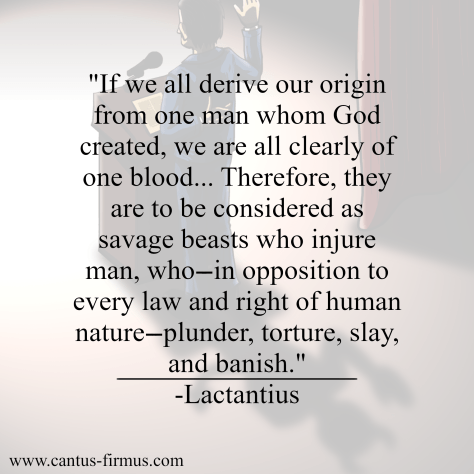
Lucius Caecilius Firmianus Lactantius was a turn of the fourth century church father from North Africa who was a professor of rhetoric and eventually the tutor of Constantine I’s son Crispus. In his Divine Institutes, he wrote of man as a creation of God unlike the animals since they are naked and defenseless, but we must survive by our wisdom and feelings of kindness to one another. “Therefore,” Lactantius wrote, “kindness is the greatest bond of human society; and he who has broken this is to be deemed impious, and a parricide. For if we all derive our origin from one man, whom God created, we are plainly of one blood… Therefore they are to be accounted as savage beasts who injure man; who, in opposition to every law and right of human nature, plunder, torture, slay, and banish.”
In other words, the mindset that separates mankind into races, nations, and conflicting interests is utterly contradictory to the Christian teaching of one humanity which derives its existence from one God.
2.

Irenaeus, the second century Turkish bishop from the south of France, was reflecting here on a now mostly forgotten reading of Deuteronomy 32:8-9 which saw God as dividing the nations at the tower of Babel and placing them under the authority of angelic beings which became corrupted. It was these angels which Paul described as the “powers and principalities” which Christ disarmed at the cross (Colossians 2:15), making a new nation from many peoples and delivering us from the power of evil national spirits. Those who insist upon national and ethnic identities are not under the one kingdom of Christ, but are still under the authority of corrupt angels. This is explained in greater detail in my book Fight the Powers: What the Bible Says About the Relationship Between Spiritual Forces and Human Governments.
3.
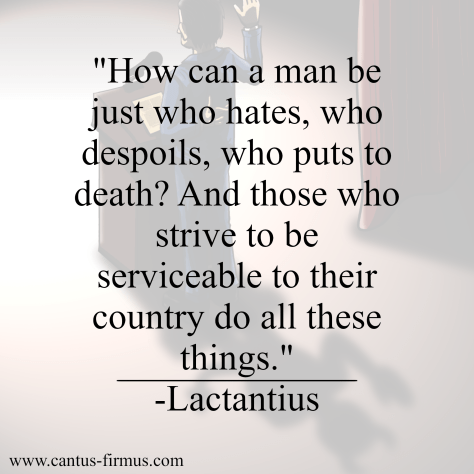
Lactantius also wrote in his Divine Institutes of those who spoke of the virtue of putting “the interests of our country as in the first place” as really intending “the inconveniences of another state or nation;” in other words:
“to extend the boundaries which are violently taken from others, to increase the power of the state, to improve the revenues,–all which things are not virtues, but the overthrowing of virtues.”
Is it virtuous to take away “the union of human society,” “innocence,” “the property of another,” and, most of all, “justice?”
Lactantius therefore concluded:
“How can a man be just who injures, who hates, who despoils, who puts to death? And they who strive to be serviceable to their country do all these things: for they are ignorant of what this being serviceable is, who think nothing useful, nothing advantageous, but that which can be held by the hand; and this alone cannot be held, because it may be snatched away.”
4.
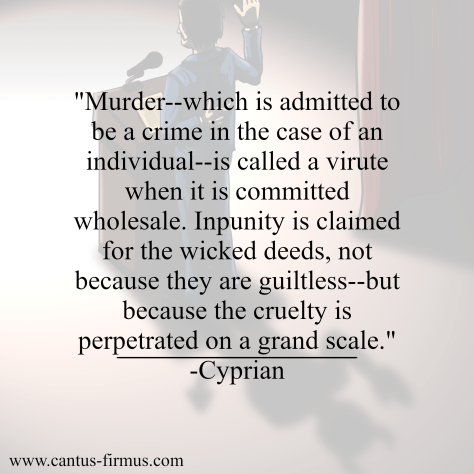
The third century bishop Cyprian of Carthage, in his first epistle to Donatus, wrote of humanity’s violence toward one another: of roads blocked up by robbers, of seas beset with pirates, but also of “wars scattered all over the earth with the bloody horror of camps.
“The whole world is wet with mutual blood; and murder, which in the case of an individual is admitted to be a crime, is called a virtue when it is committed wholesale. Impunity is claimed for the wicked deeds, not on the plea that they are guiltless, but because the cruelty is perpetrated on a grand scale.”
To put it plainly, we do not escape the condemnation due to a killer simply because our killing is done in a military uniform or because we cheer on the violence from the sidelines while draped in our nation’s flag. The fact that murder is performed systematically on a grand scale does not mean it is morally praiseworthy, though this is the assumption we make when we cheer on our nation’s bloody conflicts.
5.
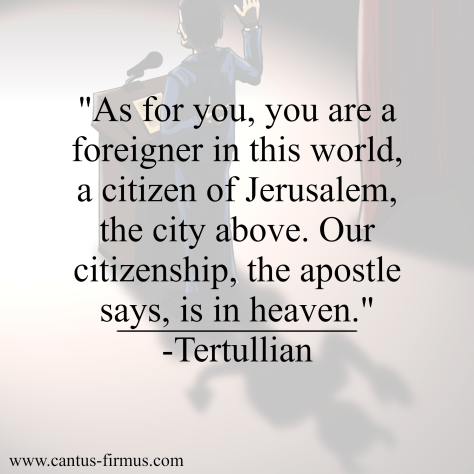
The second century North African bishop Tertullian, in De Corona (On the Military Crown), spoke critically of those who held their Roman citizenship in high regard with pomp and circumstance. Instead, he exhorted his Christian readers to remember that “you are a foreigner in this world, a citizen of Jerusalem, the city above. Our citizenship, the apostle [Paul] says, is in heaven.”
September 19, 2019
Five Bad Arguments to Stop Using in Discussions About Politics
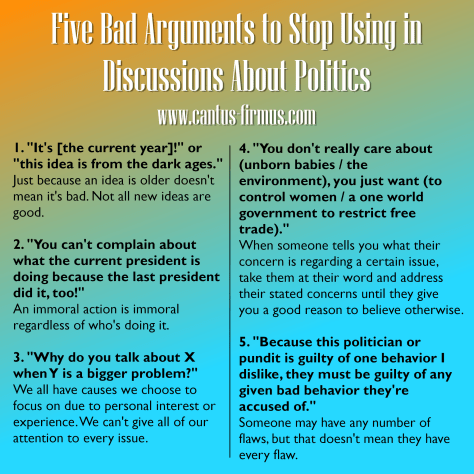 Click the image above to download this infographic.
Click the image above to download this infographic.“It’s [the current year]!” or “this idea is from the dark ages.”
Just because an idea is older doesn’t mean it’s bad. Not all new ideas are good.“You can’t complain about what the current president is doing because the last president did it, too!”
An immoral action is immoral regardless of who’s doing it.“Why do you talk about X when Y is a bigger problem?”
We all have causes we choose to focus on due to personal interest or experience. We can’t give all of our attention to every issue.“You don’t really care about (unborn babies / the environment), you just want (to control women / a one world government to restrict free trade).”
When someone tells you what their concern is regarding a certain issue, take them at their word and address their stated concerns until they give you a good reason to believe otherwise.“Because this politician or pundit is guilty of one behavior I dislike, they must be guilty of any given bad behavior they’re accused of.”
Someone may have any number of flaws, but that doesn’t mean they have every flaw.
September 17, 2019
Ten Movies Every Christian Should See
With the caveat that this blog’s title is hyperbolic and that not every Christian will feel comfortable watching every movie on this list, it’s hard to downplay the importance of film as an artistic medium. Film has an intense power to make us think about truth and values. Here are ten films that any Christian wanting to be challenged to reflect upon their faith or find a jumping off point for a conversation with a non-Christian friend ought to watch.
1. Amadeus
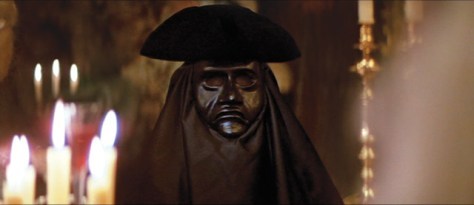 Not as fun at parties as he might look.
Not as fun at parties as he might look.Amadeus is a fictionalized account of the death of 18th century composer Wolfgang Amadeus Mozart. It centers on the character of rival composer Antonio Salieri, whose jealousy of Mozart sends him down a path of revenge–not just against the composer but also against the God who blessed him with the talent that Salieri feels that should have been his. The turning point in the film is Salieri’s prayer to God:
“From now on we are enemies, You and I. Because You choose for Your instrument a boastful, lustful, smutty, infantile boy and give me only the ability to recognize the incarnation. Because You are unjust, unfair, unkind I will block You, I swear it. I will hinder and harm Your creature on Earth as far as I am able. I will ruin Your incarnation. “
Amadeus raises questions about our expectations of God and what happens when they aren’t fulfilled, as well as the excuses we make to justify harboring hatred in our hearts.
The Director’s Cut adds material that better explains holes in the theatrical version, but is overall a lesser film. Watch the theatrical version if you can find it.
Get Amadeus on Amazon.
2. Night of the Hunter
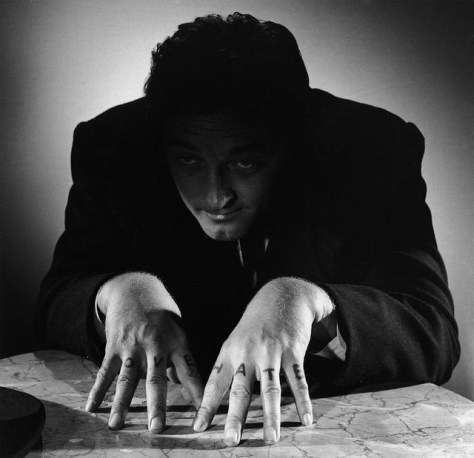
Pray you don’t catch these hands.
Night of the Hunter has one of the most disturbing villains in the history of film. Harry Powell is a self-appointed itinerant preacher roaming from town to town murdering widows. When he winds up in jail for car theft and meets a bank robber about to be hanged, he gets the idea that the man’s two children know where the money was hid and hatches a plan to marry his widow and find the loot. When his new wife becomes wise, he kills her and corners the children. They barely get away and take a boat down river. The last half of the film focuses on the two children trying to hide out from Powell.
When they are taken in by Rachel Cooper, a widow who both talks and walks the Christian faith, the film heads for a climax between the murderous preacher and the tough but loving foster mother. Charles Laughton directs this movie as if it were a German expressionist fever dream, and the details really stick with you. The scene of Powell waiting in Rachel’s garden for the perfect moment to strike like the serpent of Eden while she sits with a rifle guarding the children and the two sing the harmonies for “Leaning on the Everlasting Arms” is like nothing I’ve ever seen before in a movie, and it offers a perfect contrast between the fake and real Christians.
I discussed this film on a podcast episode with Mystery Science Theater 3000’s Bridget Nelson which can be heard here.
You can click here to get Night of the Hunter on Amazon.
3. Batman V Superman: Dawn of Justice
 Bat-scowl, patent pending
Bat-scowl, patent pendingBatman V Superman got a lot more grief than it deserved. It portrayed a Batman that’s very familiar to readers of Frank Miller’s iconic series The Dark Knight Returns and it told a very old story in a brand new way.
At its core, Batman V Superman is about humans feeling like God has abandoned us; that since the divine has no skin in the game and can’t possibly sympathize with our pain, we’d be better off if God just died. Superman is the movie’s stand-in for God and is compared to the deity on numerous occasions by both Batman and antagonist Lex Luthor.
The turning point in the film is Batman’s realization that Superman is, in the words of director Zack Snyder, “an alien, but . . . he’s more human than [Batman.] He’s sort of embraced all the good parts of the human race, and so Batman’s able to sort of see, in a lot of ways, a thing that he is not.”
The obvious model for Superman here is Christ–the God who became a man and suffered on our behalf, who reminds us that God is not so distant as He might at times seem.
I discussed this film on a podcast episode which can be heard here.
You can click here to get Batman V Superman: Dawn of Justice on Amazon.
4. A Face in the Crowd
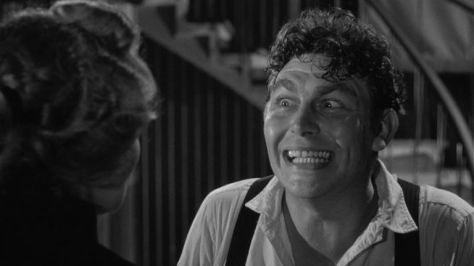 That face you make when Aunt Bea offers you a slice of her famous apple pie.
That face you make when Aunt Bea offers you a slice of her famous apple pie.A Face in the Crowd is a story about a common criminal (played by Andy Griffith) who makes his way up the rungs of the celebrity ladder by packaging folksy, homespun wisdom for mass media consumption. Before long he’s advising politicians and mocking the stupidity of the millions of viewers who hang on his every word.
Griffith is tremendous in this role. Rumor has it that he would smash up chairs before takes to ratchet up his intensity. Watching his performance, it’s not hard to believe.
What makes this film significant for Christians is its warnings about false messiahs in celebrity culture, politics, and advertising–a danger which we are unfortunately no less susceptible to than our non-Christian counterparts.
Get A Face in the Crowd on Amazon.
5. Les Miserables
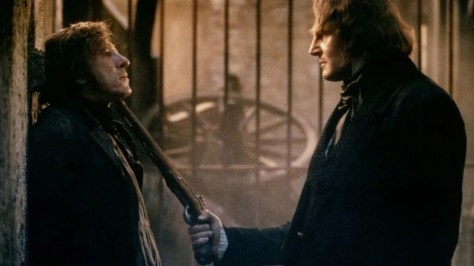 “Okay, I’m listening now; shoot. I mean fire away! I mean…”
“Okay, I’m listening now; shoot. I mean fire away! I mean…”While there have been countless adaptations of Victor Hugo’s 1862 novel, the 1998 film with Liam Neeson, Geoffrey Rush, and Uma Thurman is probably my favorite. Its primary importance for Christians, apart from being a beautiful and well-crafted story, is its musings on law and grace.
The conclusion, which I won’t spoil here, brings mercy and punishment together in a way that serves as a pointer to their union on the cross.
Click here to get Les Miserables on Amazon.
6. Becket
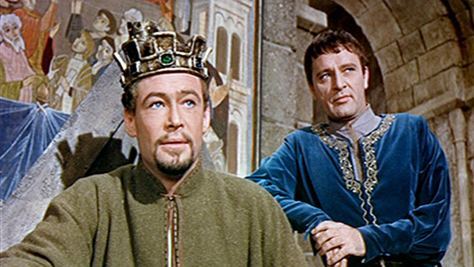 When they ask you and ya boy who y’all think the king of memes is.
When they ask you and ya boy who y’all think the king of memes is.Becket is a film about the relationship between King Henry II and his friend Thomas Becket. Henry, knowing Becket as the facilitator of his debaucherous whims, appoints him the archbishop of Canterbury in hopes of having a lackey in the position who won’t oppose him. Unfortunately for Henry, Becket has a religious awakening once he’s ordained.
Becket is about standing your ground and doing the right thing instead of the easy thing. But it’s not just a moral tale; it’s also a really excellent movie. It’s hard to take your eyes off the main actors. Peter O’Toole’s King Henry II is bombastic and Shakespearean. In contrast, Richard Burton plays Thomas Becket as lowkey–hiding just under the surface his pathos and pain as a subjugated Saxon forced to cater to a cruel Norman king.
Click here to get Becket on Amazon.
7. Focus
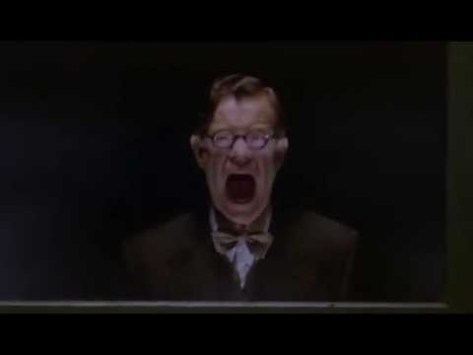 When you see people sleeping on a really good William H. Macy movie.
When you see people sleeping on a really good William H. Macy movie.After Larry Newman (played by William H. Macy) gets glasses that make him appear Jewish, his life in 1940s Brooklyn changes for the worse as he loses his job and is targeted by an anti-semitic neighborhood group. First incensed at the notion that he would be treated as a Jew by his colleagues and neighbors, a new friendship with a Jewish store owner brings him around to refusing to reject the label of “Jew” when it’s applied to him.
Of course the Christian faith and Bible have a great deal to say about identifying with the oppressed and bullied. Leviticus 19:34 commanded the Israelite to love the stranger as they loved themselves. Jesus, though being God in nature, took on the form of a subjugated Jew in Roman-occupied Palestine and told His followers that anyone who helped someone who was hungry, naked, a stranger, or in prison would be treated as if they had helped the Lord Himself. Focus illustrates this principle of identifying with the downtrodden powerfully.
Click here to get Focus on Amazon.
8. Crimes and Misdemeanors
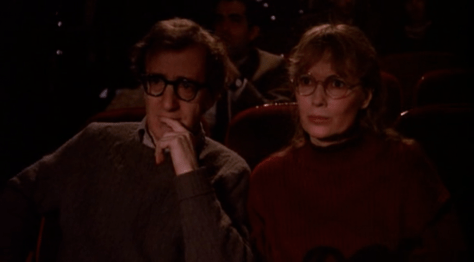 Trying to enjoy a good Woody Allen movie after all of the controversy about his personal life.
Trying to enjoy a good Woody Allen movie after all of the controversy about his personal life.This Woody Allen film follows two characters: one a wealthy ophthalmologist portrayed by Martin Landau and the other an independent filmmaker portrayed by Allen. Both have to decide how much guilt they can live with: Allen in his decision to make a film for money that compromises his values and Landau in his decision to kill his mistress so he can continue to live a comfortable life in polite society. I won’t spoil the ending, but the film is a great conversation starter as it brings together questions of guilt, judgment, and whether right or wrong means anything if there is no God.
I discussed this film on a podcast episode with Mystery Science Theater 3000’s Bridget Nelson which can be heard here.
You can click here to get Crimes and Misdemeanors on Amazon.
9. The Mission
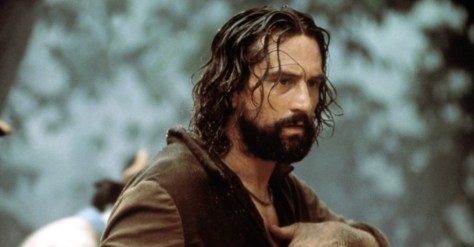 When you’re working as a slaver in Argentina but you remember that you left your oven on in Spain.
When you’re working as a slaver in Argentina but you remember that you left your oven on in Spain.The Mission takes place in Spanish and Portugese occupied South America in the 1750s. Robert De Niro plays a slaver who kills his brother after catching him in an affair with his wife. The Jesuit priest played by Jeremy Irons is tasked with bringing De Niro through his penance.
After coming to terms with his guilt and accepting God’s forgiveness, the former manstealer becomes a contrite priest serving the natives he once kidnapped and forced into slavery. When the church caves to political pressure and abandons the mission to the greed of the European colonists, the two priests decide to stay back with the Guarani Christians–De Niro as a soldier repelling Spanish-Portugese forces and Irons as the leader of a non-violent resistance movement. This examination of what it means to live as a Christian in dire times will stick with you, as will the compelling score by Ennio Morricone.
I discussed this film on a podcast episode which can be heard here.
You can click here to get The Mission on Amazon.
10. Silence
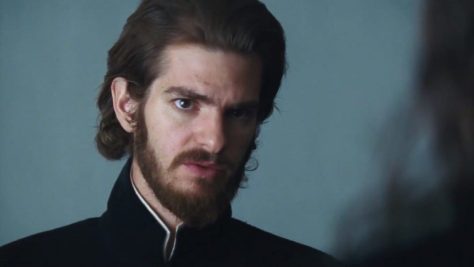 Spider-priest, Spider-priest. Does whatever a Spider-priest does. Can he have a wife and kids? No, but he’ll absolve your sins. Watch out. he is the Spider-priest.
Spider-priest, Spider-priest. Does whatever a Spider-priest does. Can he have a wife and kids? No, but he’ll absolve your sins. Watch out. he is the Spider-priest.Martin Scorsese’s Silence was a long time coming. The director had been wanting to adapt Shusaku Endo’s novel about Jesuit missionaries suffering under Japanese persecution for over two decades.
Visually the film is absolutely arresting. Scorsese manages to capture the feeling of wide open space where the comforting voice of God is nowhere to be heard. By the end of the film, he’s not only managed to make tangible those feelings we have when God appears to have nothing to say in our suffering, but also to ask what it means to take Christ’s suffering into ourselves. You may or may not like the answers Silence provides, but it’s worth thinking about the questions.
I discussed this film on a podcast episode with Christian apologist Lenny Esposito which can be heard here.
You can click here to get Silence on Amazon.
September 15, 2019
PODCAST: Cantus Firmus at the Movies Ep. 16 – Inception (w/ Adam Graham)
Adam Graham was my guest to discuss the 2010 Christopher Nolan film Inception, a movie about a mission to implant an idea in the brain of a leader of industry by infiltrating his dreams.
Our discussion led us to think about how a simple idea can spread, whether reality is objective or subjective, and how guilt can begin to feel larger than life.
Adam Graham is behind the website http://www.nokingbutchrist.org/ as well as the Youtube page No King But Christ. The mission of No King But Christ is to better unite the Christian worldview with libertarian principles.
Audio:
http://cantus-firmus.com/Audio/20190914-CFATM-Ep16-Inception(wAdamGraham).mp3
Music:
“Octagon Pt 2” by Polyrhythmics. Licensed under CC BY 3.0
http://www.needledrop.co/wp/artists/polyrhythmics/
August 22, 2019
PODCAST: The Anti-War War Vet – A Conversation with John A. Dangelo III
John A. Dangelo III was a marine deployed in Afghanistan. Now he’s the man behind AntiWarWarVet.com.
In this episode he shares his journey–both political and spiritual–from a believer in state violence to an anti-war advocate.
Audio:
http://www.cantus-firmus.com/Audio/20190822-TheAntiWarWarVet.mp3
Music:
“The Itis” by Polyrhythmics. Licensed under CC BY 3.0
http://www.needledrop.co/wp/artists/polyrhythmics/

